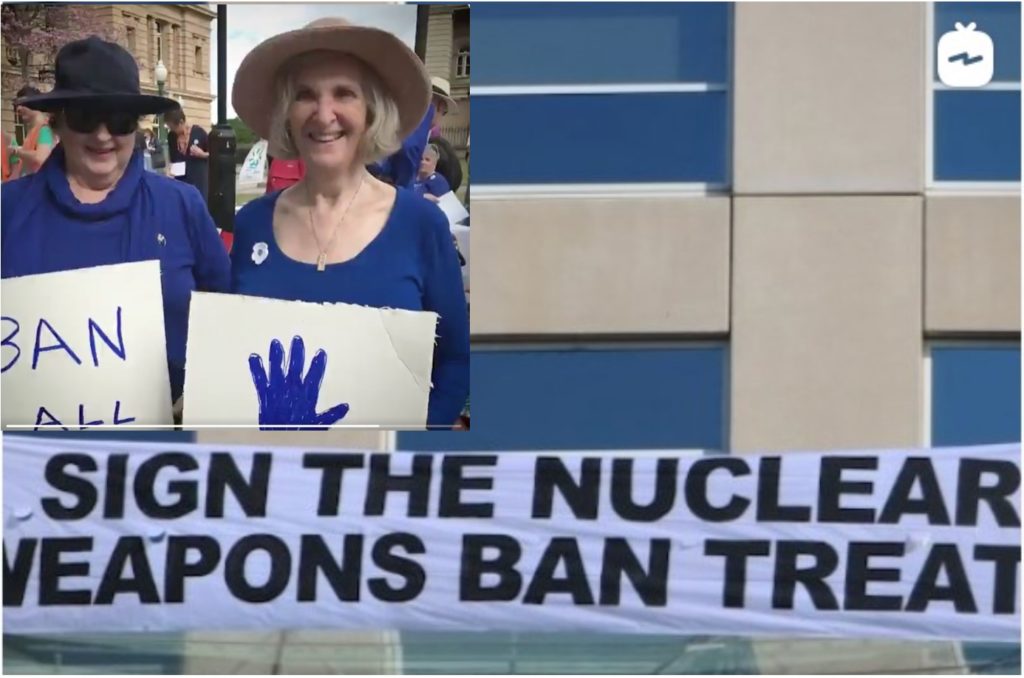
Last year I took part in a ‘Ban the Bomb’ march. Many organisations were involved, including WILPF (The Women’s International League for Peace and Freedom), and the photo above is thanks to the keen eye of WILPF’s International Treasurer, Kerry McGovern, who noticed it in an Instagram feed of hundreds of photos to celebrate the fact that the UN had reached the milestone of the 50th ratification of the UN Global Nuclear Weapons Ban Treaty.
Here’s the situation
With the Honduras, 50 countries have now ratified the UN Global Nuclear Weapons Ban Treaty and there was much celebration. There are 84 signatories, so 34 are still to ratify. None of the 84 have nuclear weapons. Meanwhile countries that do, like the USA, Russia, the UK, France and China, India, Pakistan and North Korea (and likely Israel) have not signed. Australia also has not signed. It does not have nuclear weapons but it does possess the uranium which makes them possible. So effectively those that have signed, even if they haven’t yet ratified, are those who have everything to gain and nothing to lose.
We are now just a few months away from the end of the ten year agreement between the USA and Russia to limit nuclear research and testing.
No wonder the world is getting nervous!
But is treating nuclear disarmament as a moral issue the most effective way forward?
It certainly is a moral issue, and ‘Ban the Bomb’ marches such as the one that I took part in last year, keep the issue in the public mind, but is this the most effective way to bring about change?
When we look at the issue clear eyed we can see that it is those who have nuclear weapons who are the most at risk, both physically and morally. They are the ones who have the difficult decisions to make, not the 84 signatories from the non-nuclear countries. And after the experience of Ukraine, a country that did have nuclear weapons but ceded them to Russia in the breakup of the USSR and then suffered the consequences, it is not surprising that those who currently possess nuclear arms are in no hurry to dispossess themselves.
So is it not time to invert our thinking?
Instead of collecting masses of signatories from non-nuclear nations, which only serves to make us feel we are doing something, when we really aren’t, perhaps we would be more effective if world organisations thought about how they could make things safer for nuclear weapons countries to dispossess, particularly for Russia and the USA.
I realise that thinking of nuclear armed nations as needing protection, rather than us being protected from them, is not the normal way of looking at the problem. But this ‘inverted’ thinking might serve us well in all of our encounters with others. It puts us all on the same side, rather than in ‘us v. them’ opposition. This idea can be used everywhere.
LATE BREAKING NEWS (FRIDAY 30 OCTOBER)
The Russian Mission in Vienna has just issued a 4 tweet communiqué which you can find at https://twitter.com/mission_rf/status/1321815042384449538?s=09 . Its complaint is valid and the results are just what you would expect when you set up an antagonistic, ‘Us v. Them’ framework. See what you think!
The 4 tweets read
- On January 22, 2021 Treaty on the Prohibition of Nuclear Weapons will enter into force. It was negotiated without Russia or other nuclear-weapon states. (We regret) this development for the following reasons:
- We don’t see any legal gaps in disarmament process for #TPNW to fill in. It was negotiated w/out taking into account fundamental principles of #NPT. Those principles should be applied consecutively and w/out distortion
- #Disarmament should be addressed only through consensus of all parties, including nuclear-weapon-states as per #NPT. #TPNW conceptual framework is unacceptable. It ignored strategic context & addressed #disarmament separately from existing international security environment.
- (We stand) for stands for nuclear weapons-free world & respects those sharing this view. But this process can’t be forced. We reaffirm our individual & collective #NPT commitments, but #TPNW is a mistake. It creates a rift btw states & harms #NPT. We won’t support, sign or ratify it.

Recent Comments